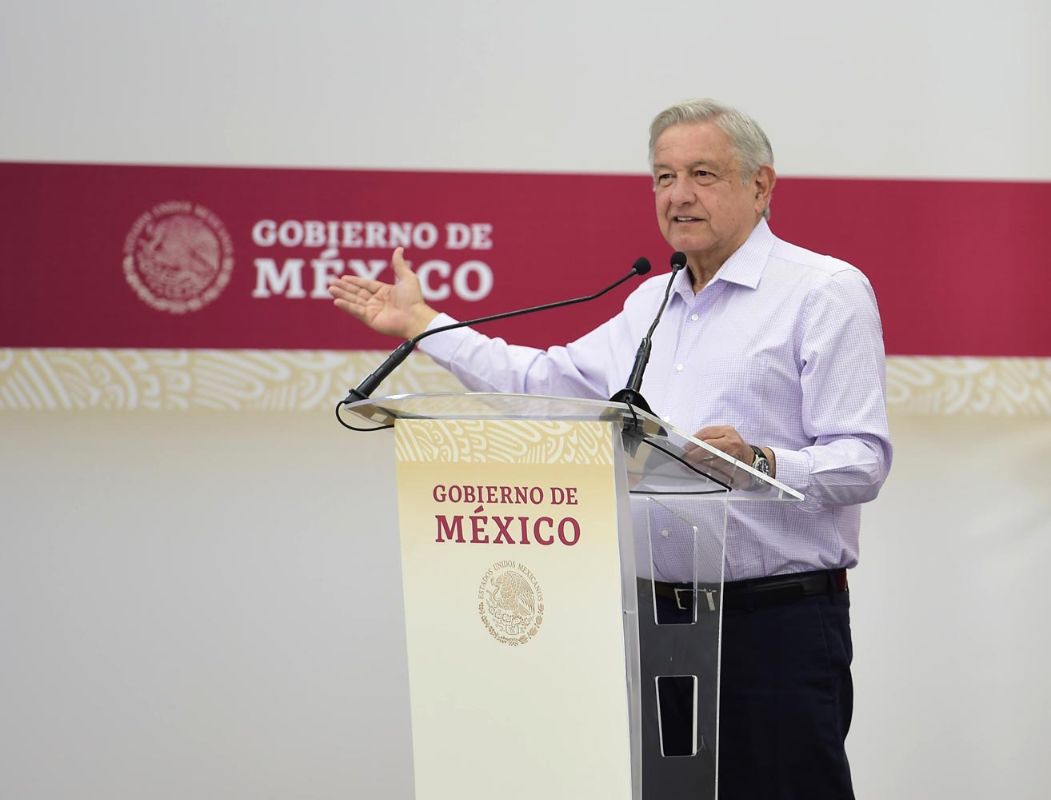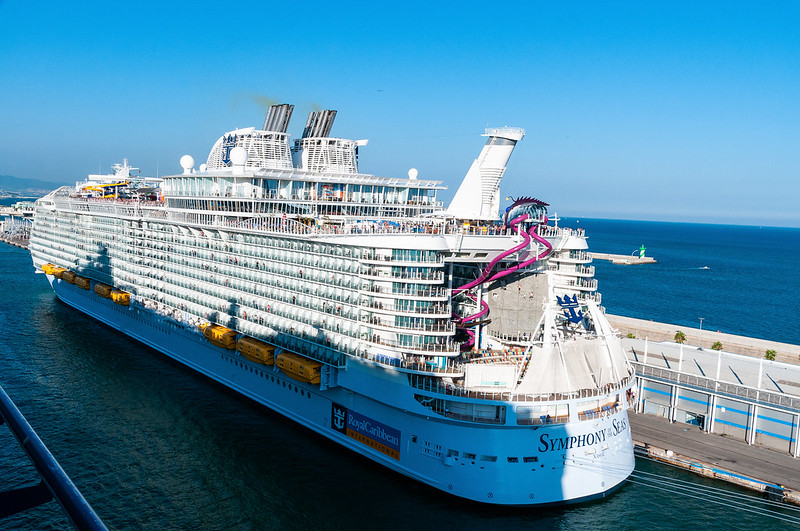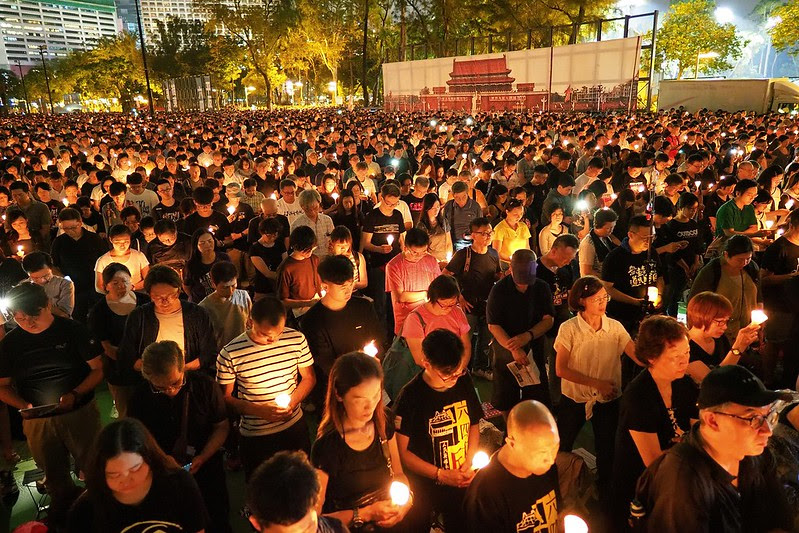Top photo: Thousands gathered in Hong Kong’s Victoria Park for a candlelight vigil on June 4, 2019 to mark the 30-year anniversary of the Tiananmen Square massacre. (Photo: Etan Liam / Flickr)
Welcome to Factal Forecast, a look at the week’s biggest stories and what they mean from the editors at Factal. We publish our forward-looking note each Thursday to help you get a jump-start on the week ahead. If this email was forwarded to you, and you like what you see, you can subscribe for free.
A look ahead:
June 4/ Anniversary of Tiananmen Square crackdown: For the second year in a row, Hong Kong officials have banned an annual candlelight vigil scheduled for Friday commemorating the Tiananmen Square massacre, citing concerns over coronavirus.
- What’s happened so far: More than 30 years after China’s violent crackdown on protests in Beijing against corruption and political repression, Hong Kongers are struggling to find ways to commemorate the event. The government’s ban on a vigil comes as Hong Kong experiences tightened political control, including a national security law passed last year that led to the mass arrests of pro-democracy activists. Last year’s June 4 vigil was also officially banned due to the pandemic, but thousands still turned up at Victoria Park — more than 20 people were arrested later for taking part in an “unauthorized assembly.”
- Impact: The usual group behind the vigil will not be organizing the event this year, but dissidents may still find ways to commemorate the event in Hong Kong. With China’s Communist Party celebrating its 100th anniversary in July, however, both Hong Kong and Beijing officials will be on higher alert than usual.

June 5/ North Carolina GOP convention: Former President Donald Trump is expected to make relatively rare public appearances Saturday as a speaker at the annual North Carolina’s Republican Party convention in Greenville.
- What’s happened so far: The convention’s dinner, where Trump is slated to speak, will be closed to the press, according to a spokeswoman for North Carolina’s Republican Party. The speech comes as Trump is reportedly preparing to resume his campaign-style rallies in a possible effort for a 2024 presidential bid and as his daughter-in-law Lara Trump reportedly weighs a 2022 U.S. Senate run in North Carolina.
- The impact: North Carolina Sen. Richard Burr is retiring, and U.S. Rep. Ted Budd, the main GOP contender to replace Burr, has previously faced censure by the state party over a vote to impeach Trump. The former president’s speech at the convention could play a significant role in the 2022 Senate election. Considering Trump’s 2020 win in North Carolina, a Trump-endorsed candidate would certainly have an advantage. Lara Trump especially could benefit, with former Trump aide Kellyanne Conway saying a Trump-endorsed candidate “who’s also named Trump has a humongous advantage.”
June 6/ Peru election runoffs: Peruvians will elect the country’s fifth president in five years in a second round of voting Sunday, bringing to a head an increasingly tight race that has polarized the nation.
- What’s happened so far: Candidates Pedro Castillo, of the Peru Libre party, and Keiko Fujimori, of Fuerza Popular, will run for the country’s highest office after winning the first round of the elections with 19 percent and 13.3 percent of the vote, respectively. An already polarizing race, the campaigns have been marred with accusations following last week’s massacre attributed to the rebel group Shining Path that left more than a dozen people dead. The group has historically carried out attacks during electoral periods as a means of applying pressure on citizens to not vote. On Thursday, outgoing President Francisco Sagasti announced a special security operation will be in place Sunday to ensure the safety of citizens at polls.
- The impact: The latest surveys predict a technical tie between the candidates, though left-wing Castillo appears to be leading in voters’ intention with 0.9 percent over conservative Fujimori. The close race reflects one of the most polarized political scenarios in the country’s history, which has recently revolved around the economy.

June 6 / Mexican local and legislative elections: Voters in Mexico will elect hundreds of politicians to local positions as well as 500 deputies to the lower house of its legislature Sunday, which could dramatically change the direction of President Andrés Manuel López Obrador’s tenure.
- What’s happened so far: After two unsuccessful runs for president, López Obrador refused to concede and created his own political party, MORENA. In 2018, he won, becoming the country’s first candidate to win an outright majority in 30 years. Critics have repudiated López Obrador’s conduct during this election season, including instances when he has mocked opposition candidates and called for their arrest. He also publicly attacked the two institutions that oversee elections. In light of the political fervor, this year’s elections are being called the most violent in 20 years. At least 88 people running for office have been killed since September, including Alma Barragán, who was running for mayor of Moroleón.
- The impact: Many of these political killings have to do with organized crime. Cartels will finance politicians that help them and attack or kill those that don’t. This may have become more prevalent with López Obrador, who has a hands-off, long-term approach to dealing with organized crime. If voters no longer want that strategy, López Obrador may lose his majority in the Chamber of Deputies. Experts warn, if that happens, he may refuse to admit defeat and declare electoral fraud, as he has done before.
June 7/ Thailand vaccine drive begins: Thailand will launch the first mass coronavirus vaccination program for its 66 million residents Monday, as the country struggles with its most severe outbreak yet.
- What’s happened so far: Despite a year of relative success in slowing the spread of coronavirus, thanks in part to the early closure of its borders, Thailand set almost-daily records in coronavirus deaths in April and May. The latest statistics show more than 80 percent of the country’ confirmed cases were detected during the current surge, which is believed to have been fueled by Thais traveling during the weeklong Thai New Year holiday in mid-April. This, coupled with the country’s low vaccination rate — only 2.6 percent of the country’s population has been vaccinated so far — sparked much government criticism and concerns over whether the country will reach herd immunity before it reopens its borders for tourists, quarantine-free.
- The impact: Amid anxiety over vaccine supplies, the health ministry reassured there will be “a vaccine for everyone” from June 7. To date, Thailand has secured some 3.5 million Sinovac vaccines from China and another 61 million doses of the AstraZeneca vaccine, of which six million have been locally produced. Through the mass inoculation, Thailand hopes to kickstart the revival of tourism, its largest industry, starting with the popular resort island Phuket in July. The pilot scheme will welcome vaccinated travelers and includes plans to inoculate most of the island’s residents before reopening — all which, the health ministry insists, is “on track”.
June 8/ Sheikh Jarrah court hearing in Israel: The Supreme Court of Israel is due to hear back from Attorney General Avichai Mandelblit on Tuesday after he asked judges to delay their decision on the eviction of Palestinian residents from the East Jerusalem neighborhood Sheikh Jarrah amid a surge in tensions last month.
- What’s happened so far: Dozens of the neighborhood’s Palestinians are at risk of losing their homes to Israeli settlers who claim ownership of the land the Palestinian homes are built on. The Palestinians are appealing lower court rulings in favor of the settlers, who are basing their case on Israeli law that allows only Jews to reclaim land lost during war. Military confrontations erupted in the Gaza Strip in May over the planned evictions.
- The impact: In addition to contributing to the worst spike in violence in at least seven years, the potential evictions have drawn international condemnation, including from the United States, which said it’s against the displacement of Palestinians in East Jerusalem neighborhoods. A ruling in favor of the settlers could also spark a new round of fighting, as Hamas and other Gaza Strip–based militias have threatened to renew rocket attacks on Israel if the evictions are carried out.

June 9/ Navalny Court Hearing: Alexei Navalny, a prominent critic of Russian President Vladimir Putin, will appear once again in court Wednesday after the Moscow City Court postponed his initial hearing scheduled for May 17.
- What’s happened so far: Navalny was initially sent to prison in February after allegedly violating the terms of a previous conviction and will likely spend just short of three years in jail. He was arrested immediately upon his return from Germany, where he had been undergoing treatment after being poisoned, allegedly by the Russian government. This hearing will focus on Navalny’s network of organizations, which the Kremlin is alleging are “extremist.”
- The impact: A ruling against Navalny’s operation, which is widely anticipated, will place the Kremlin critic’s network in the same classification tier as groups such as ISIS and Al-Qaeda in Russia, leaving all of those affiliated with the operations susceptible to facing prison time. While Putin appears determined to hamper Navalny’s operations and hand the opposition figure his first extended prison sentence, it will likely do little to stem the protests against Putin’s extended rule. While Navalny is often described as the driving force behind the protests, the demonstrations are largely about corruption.
June 9/ Mongolian presidential election: Three candidates will be on the ballot Wednesday as voters in Mongolia pick a successor to outgoing President Khaltmaagiin Battulga.
- What’s happened so far: In last year’s parliamentary elections, the ruling Mongolian People’s Party (MPP) won 62 of 76 seats, in part due to a new electoral system that consolidated power in rural districts where MPP support was strongest. That new system was one of several constitutional amendments made in 2019, which also limited the president to a single six-year term and strengthened the power of the prime minister at the expense of the presidency. In a significant escalation of tensions this past April, President Battulga issued a decree attempting to disband the MPP entirely, just days after the country’s constitutional court determined he could not seek another term.
- The impact: Ex-party chairman Sodnomzundui Erdene is running for Battulga’s Democratic Party, while former Prime Minister Ukhnaagiin Khürelsükh — who resigned in January following protests over the government’s treatment of a coronavirus patient and her baby — is seeking the presidency under the MPP banner. Former legislator Dangaasuren Enkhbat is the nominee for the Right Person Electorate Coalition alliance. Critics are concerned that the president’s April decree signals a threat to the country’s democracy, while others have pointed to the MPP-led constitutional amendments in 2019 as a troubling precursor to one-party rule.

What else matters:
Europe travel reopening: As vaccination campaigns against coronavirus progress across Europe, many countries are hoping to revive their economy by welcoming back tourists this summer. However, inconsistent planning has left each country to implement a unique set of rules for arrivals depending on current coronavirus outbreaks. France said last week it would require a mandatory quarantine period for those coming from the UK amid an increasing prevalence of the coronavirus variant first detected in India in Britain. Meanwhile, the UK has placed most countries on amber and red lists, meaning arrivals need to take several tests and enter quarantine. Other countries are being less cautious, with Spain reopening its borders to all vaccinated tourists and to cruise ships next week and Greece becoming one of the first countries in the world to reopen its tourism.
- Watch for: The European Union this week introduced a digital coronavirus certificate enabling travelers who have been vaccinated or tested negative for the virus to move between member states. But travelers keen to take a much-anticipated vacation are still likely to face a lot of bureaucracy with different rules applying to different destinations. Some countries require a PCR test before arrival, which can cost up to 120 euros ($146USD). People returning to the UK also need to undergo several tests depending on which country they visited. The government has pledged to lower price of the tests, but current rules make travel out of reach for many pockets. The spread of the India variant of coronavirus is also growing in several countries, which could delay reopening plans. With its high prevalence in the UK, it is yet unclear if the EU passport will apply to UK visitors
Israel coalition forms: Israel faces the end of a political era after far-right party leader Naftali Bennett and opposition leader Yair Lapid formed an alliance (members’ link) that would pave the way for the end of Prime Minister Benjamin Netanyahu’s 12-year tenure. Facing a deadline to form a government after four inconclusive elections in two years, eight relatively small parties have formed a coalition government. The alliance is likely to be fragile given their profound ideological differences — ranging from right wing, secular centrist and Islamist — and comes on the heels of an armed conflict with Palestinian factions in the Gaza Strip and widespread unrest in many Jewish-Arab cities in Israel.
- Watch for: In the coming days, Israel’s parliament will hold a confidence vote on the new government, which includes 61 out of 120 parliament members. With the new alliance’s fate dependent on a narrow margin, Netanyahu and his allies signaled that they will continue to seek potential defectors. If approved, the government will be led by Bennett, an ultranationalist former settler leader who rejects a possible sovereign Palestinian state, until 2023 when current opposition leader and centrist Lapid is set to take over as prime minister. For the first time in the country’s history, the coalition government will also include a party that represent’s Israel’s Palestinian minority.
Extended outlook: What’s on our radar in the coming weeks
June 4: Tiananmen Square anniversary; Cyprus checkpoints to reopen
June 5: North Carolina GOP convention; Ethiopian parliamentary election
June 6: Peru election runoffs; Mexican legislative elections
June 7: Thailand vaccine drive begins; Spain opens to vaccinated tourists
June 8: Sheikh Jarrah court hearing in Israel; primary elections in Virginia and New Jersey; Vice President Kamala Harris to visit Mexico
June 9: Mongolia presidential election; Navalny court hearing; Albania impeachment vote; France “health pass” in effect
June 11: G7 Summit in Cornwall; UEFA Euro 2020 men’s soccer tournament
June 12: Algerian legislative elections; Trooping the Colour military ceremony in London
June 14: NATO summit in Brussels; deadline to swear in Israeli coalition
June 17: U.S. Open golf tournament
June 18: Iranian presidential election
June 20: Tokyo state of emergency expected to end
June 21: Ethiopia election
June 22: New York City mayoral primary
June 25: Aruban general election, Derek Chauvin sentencing
June 28: Wimbledon
July 11: Elections in Moldova
July 23: Tokyo Summer Games

